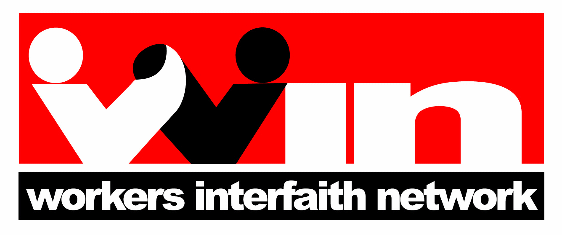A reflection on the lectionary gospel reading for Sunday, November 20th
The weekend of November 19th - 20th, Workers Interfaith Network is encouraging Mid-South congregations to observe a wage theft sabbath. The following post is a reflection on the Christian lectionary text that clergy can use to incorporate wage theft concerns into their sermons or homilies.
Many Christian churches will celebrate Christ the King Sunday on November 20th. The lectionary text for the day, Matthew 25:31-46, gives us an opportunity to reflect on just what kind of a king Jesus is.
The rulers of this world often seek power and wealth for themselves. In Matthew 25, Jesus once again points toward the "upside down" kingdom of God. He does not ask the nations when they have amassed gold for him or gathered armies for battle. Instead he declares that our actions toward the most impoverished and vulnerable have actually been done to him.
In reading Jesus' words about the hungry, sick, and imprisoned, we might assume Christ only asks us to meet the immediate needs of the poor. If we consider Matthew 25 in light of Jesus' many other teachings about wealth, poverty, and injustice, we quickly see that providing comfort alone is not enough.
From Jesus' announcement in Luke 4 that he has come to set at liberty those who are oppressed, to his turning over of the moneychangers' tables in the Temple, it is clear that the kingdom of God includes economic justice. It isn't hard to imagine Jesus adding another criteria to his long list in Matthew 25. I can hear the nations asking him, "Lord, when did we see you oppressed, and we acted for justice for you?" Other nations might ask, "Lord, when were you a victim of injustice, and we stayed silent?"
After all, hunger, poverty, and injustice are intimately connected. Seeking God's kingdom means both feeding the poor and asking why they are hungry. And for many of our brothers and sisters, their hunger and poverty is through no fault of their own. Some cannot find work at all, or enough work to pay the bills. Others have worked hard, and have been taken advantage of by an employer who refuses to pay them.
There are few insults that sting as deeply as laboring for another person, and then not receiving the pay that has been promised to you. While it is shocking, wage theft is not uncommon. Recent research suggests that as many as two out of three low-wage workers have been cheated out of some wages that are owed to them.
The bad news is that when people of faith and good will are silent, wage theft continues unchecked.
The good news is that when people of faith speak up with victims of injustices like wage theft, bad employers are much less likely to get away with cheating their workers.
This is another way that the church can feed the poor, in addition to our food pantries and soup kitchens. When wage theft is stopped, many of the hungry and naked can feed and clothe themselves through their own labor, as they desired to all along.
Find more resources and sign up your congregation to participate in the wage theft sabbath.
Employee Bankruptcy and Lawsuits
10 months ago







